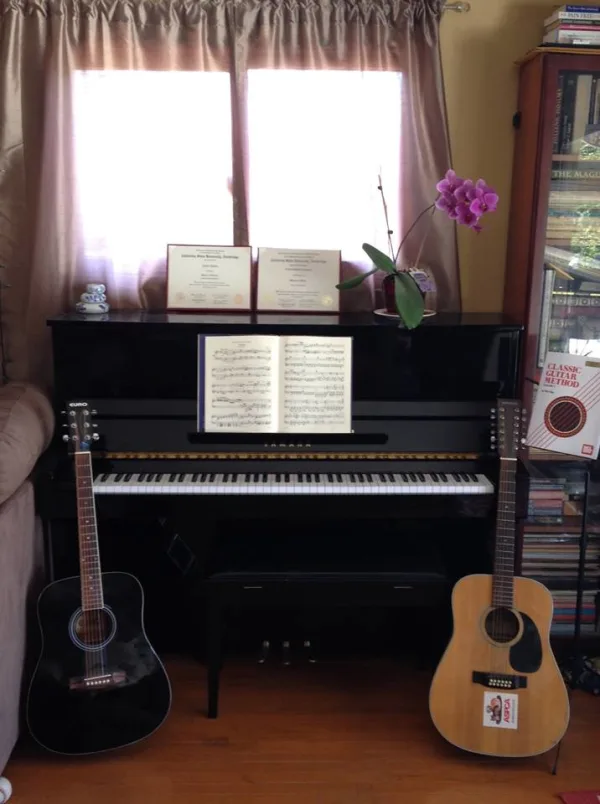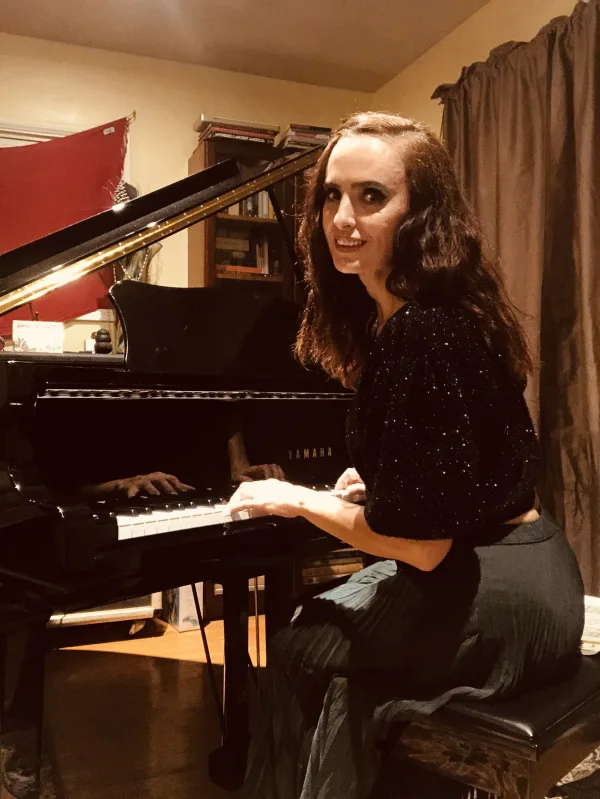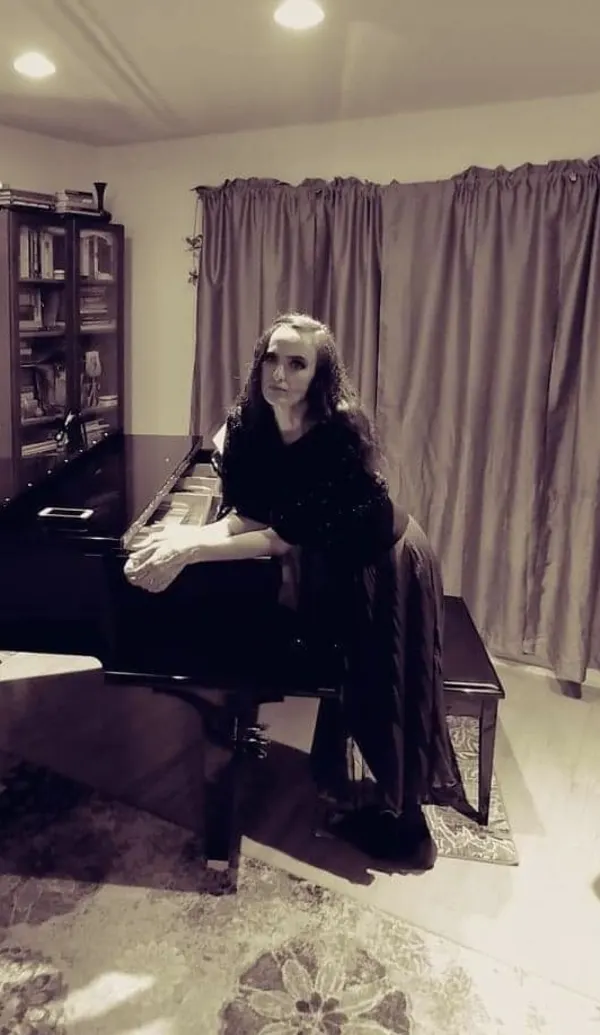SMART Music Lessons
About
Hello everyone! 👋🌺
I must apologize from the beginning for the length of this... introduction, but hopefully the time spent reading it will be worth it.
I wanted to bring to your attention something that captivated me and altered my teaching style many, many years ago, when I was studying Piano Pedagogy, Performance and Composition: the Socratic Method.
I’m sure you most likely have heard of this, but very few people are familiar with the concept.
It all started with this quote from the Greek philosopher, Socrates: "Let us examine the question together, my friend, and if you can contradict anything I say, do so and I will be persuaded."
This ancient form of give-and-take discourse is founded on Socrates’ belief that lecturing was not an effective way to teach all students. The Socratic Method requires cooperative argumentative dialogue between individuals, asking and answering questions that stimulate critical thinking, lead to the desired answer, and draw out underlying presumptions. This encourages listening, thinking, reading, speaking critically, and feeling a sense of wonder about the world's knowledge.
Inside a regular classroom, students can memorize facts, but too often, the critical thinking required to analyze cause and effect -- say, how a specific river encouraged ancient trade -- eludes them unless the teacher spells it out, telling them the "Right" answer.
In a traditional classroom, asking and answering questions is stressful to many students who are afraid their answer will be wrong. This is where the student-directed, no-right-wrong-answer Socratic Method shines.
The Socratic Method is not passive. Students don't consume; they create, participate, and gain a deeper understanding of the topic. The goal has nothing to do with who wins the argument but how evidence and ideas are presented.
One of the biggest reasons for the Socratic Method's popularity is that it encourages and rewards higher-order thinking skills like evaluating, analyzing, and applying. These mindsets help students learn independently and develop them into lifelong learners.
This teaching method is not only about sharing ideas. It's about honing listening skills -- something that is absolutely essential to any level of success in life. Students begin to love learning because it comes from themselves and their peers. They develop an understanding of the difference between arguing and discussing: The former is emotional; the latter, while still impassioned, is respectful.
In Socratic teaching, we focus on giving students questions, NOT ANSWERS. One of my most beloved professors, Dr. Charles Fierro was very fond of saying (during our one-on-one lessons, when I would complain about his lack of answers to my questions): “Aritina, I will never spoon feed you! But I will always be glad to ask questions that will help YOU find the correct answer!”
Nowadays, when a student asks me: “Is that right?” or “What’s this note?” (etc) my response is: “You know the answer! Let’s find it together!” or “You tell me! You got this! Let’s figure it out!” Inevitably, when led toward the answer via the right questions, the student is able to come upon the solution that seemed so elusive at first!
That, in a minimal nutshell is what the Socratic Method is all about: encouraging our kids to find the appropriate or correct answers by asking the right questions OF THEMSELVES!
Socratic inquiry is emphatically not "teaching" in the conventional sense of the word. The leader of Socratic discourse is not the provider of knowledge, filling the empty minds of mostly passive students with facts acquired through years of study. As the people in the School of Education would say, the Socratic teacher is not "the sage on the stage." In the Socratic method, there are no lectures and no need of rote memorization.
This is the style of teaching I have been striving toward for the last 20 years. It is obviously a bit more difficult to achieve certain aspects of this pedagogic style, since I usually don’t work with students in a group setting. Regardless of the setting and the number of students involved, though, the main objective can still easily be achieved: engage the student by ASKING the right questions, by guiding him/her to where their appropriate answer lies, rather than providing an unearned, spoon-fed answer.
Over the past 20 years, I have found this pedagogic method to be more effective not just in teaching music, but in the overall, well rounded development of young, sponge-like minds!
If anyone would like to engage in further discourse regarding this teaching method, please feel free to comment, text or call me to further discuss! Socrates and I would encourage discussion and debate!😉😁
Thank you for your patience, and I look forward to hearing from you!
I adore sharing my love and appreciation for music with other people, young or old, it does not matter!! Nothing is better than seeing that a-ha moment on a student's face! Nothing compares to seeing a student play a recital and doing well and receiving much deserved applause and praise! Nothing surpasses the feeling of satisfaction and pride than seeing a 70-year-old man, who loved jazz in his youth and never got a chance to learn it, playing his favorite jazz song for the first time!❤️
Music can also be very therapeutic! I have had ADHD students and children on the autism spectrum, who have improved significantly because of their piano lessons! When their parents reported the increased successes of their children, and attributed it in great part to our lessons, it brought tears to my eyes! That is the best feeling in the world! And that is what I love about my work!
Specialties
Years experience
Able to read music
Lesson length
Student's age
Student has instrument
Interested musical styles
Photos and videos



Reviews
Natalie K.
Mina S.
Matthew J.
Mina S.
Cecil S.
Frequently asked questions
What is your typical process for working with a new student?
Typically, for a beginning student, I ask him/her what his/her goals are and then I go through several easy "exercises", patterns on the piano, that he/she has to play. I do this in order to determine the dexterity level, comfort with the piano geography, and how easily the student will learn in the future. We play some musical games, meant to give me insight into the student's ability. Then we move on to the first method book, and their first songs.
Unfortunately, I cannot go into great detail regarding the process for working with a new student, as all are different in one way or another. I custom tailor my approach to each and every student; I do not have a "template" that would be appropriate for everyone, as every student has different goals, abilities, prior experience and every one of us learns differently.
What education and/or training do you have that relates to your work?
MM degree in piano performance and composition; 4 semesters of Piano Pedagogy
Do you have a standard pricing system for your lessons? If so, please share the details here.
If student travels to me:
30 min- $30
45 min- $40
1 hour- $50
If I travel to student:
45 min- $55
1 hour- $65
How did you get started teaching?
I was trained at the university level and post graduate level in the areas of piano performance and pedagogy. I started teaching in my piano pedagogy classes, under my professor's observation.
What types of students have you worked with?
I have worked with a variety of students, from beginners to advanced level; in addition, I have taught students with learning disabilities, cognitive deficits, and autism spectrum disorders.
I vary my approach to lessons significantly, therefore I have experience in working with children as young as 2.5 years old, and adults all the way through their 70s.
Describe a recent event you are fond of.
After 2 months of lessons, my 4-year old student on the autism spectrum was able to maintain a beat along with my accompaniment, and identified 3 songs by their melody when I played them for him. Despite his attention deficits and impaired communication, he was able to express himself musically and formulate his own spontaneous comments and show how happy he was. The parents were very pleased, to say the least and on the verge of tears!
What advice would you give a student looking to hire a teacher in your area of expertise?
It is VITAL to have your teacher PLAY PLAY PLAY for you! I can't describe the number of teachers who cannot play their own instrument well, yet think they are adequately equipped to teach beginners! Absolutely not! I cannot stress the importance, for beginners especially, to start their musical training on the right track, or else bad habits become very challenging to fix once flawed technique has been established!
What questions should students think through before talking to teachers about their needs?
1) what do I want to get out of music lessons?
2) do I have the time to dedicate to daily practice?
3) this endeavor takes dedication- do I possess that dedication or motivation?
4) what do I need from my teacher? Patience? A firm hand? Someone who motivates me?